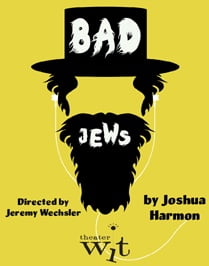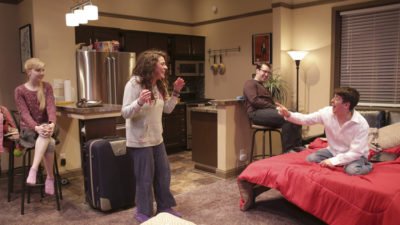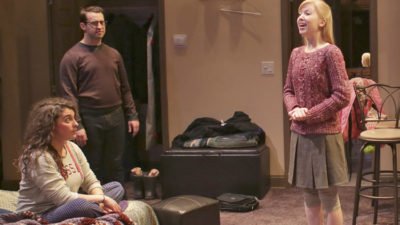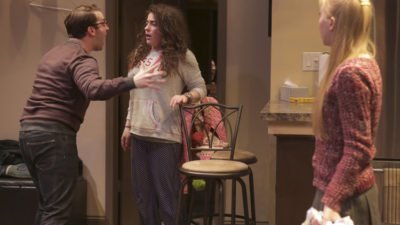Bad Jews at the Royal George Theatre
Directed by Jeremy Wechsler
At the Royal George Theatre
Bad Jews is Too Funny
Life can be funny at times, just as it can be soberly emotional. And sometimes, through the spontaneous confluence of events, it can be both, if not in the same moment then woven together tightly in a turbulent sequence. This, too, is true for life portrayed upon the stage. However, to reclaim the spontaneity of life, the artist’s craft comes in to orchestrate the weaving and conceal its seams, so that what is revealed to the audience is not the marks of craft but rather the truth of life. Bad Jews involves such a weaving – but its seams are showing.
Bad Jews takes place on the night of a funeral: the family’s patriarch has died, and his grandchildren Daphna (Laura Lapidus) and Jonah (Cory Kahane) are retired for the evening in Jonah’s apartment. Daphna talks (and talks), while Jonah – either to distract himself from grief or the cataract of Daphna’s words – disinterestedly plays a video game. (He has, after all, had to “survive” two days with her.) Finally, Daphna enters into her main appeal: being the only “real Jew” among the grandchildren, she believes their grandfather’s Chai necklace – an object rich in religious and family significance – ought to pass to her and not to Jonah’s brother Liam (Ian Paul Custer), who turned from his Jewish faith to atheism. After all, Liam didn’t even make their grandfather’s funeral because he “lost” his cellphone while in Aspen with his girlfriend. Diplomatically, Jonah states (repeatedly) that he doesn’t want to get in the middle, but Daphna’s persistence eventually leads him to agree to offer her some assistance in staging the discussion over the Chai necklace with his brother.
When Liam finally arrives with his girlfriend Melody (Kelly O’Sullivan), he has no idea what he’s walking in to. Or, rather, upon spotting Daphna in Jonah’s apartment, he knows exactly what he’s walking into, and soon is already looking for another place where he and Melody can spend the night. While Daphna takes the opportunity to grill the distinctly non-Jewish, blonde-haired, blue-eyed Melody, Liam attempts to enlist Jonah for his own support against Daphna on the matter of their grandfather’s Chai necklace. His diplomatic non-committal again failing him, Jonah irresolutely agrees to help his brother. At that point, Bad Jews launches full-throttle, guns blazing towards its startling conclusion, with the arch-nemeses Liam and Daphna each having their moment(s) to vent their vitriolic self-righteousness at the other.
According to play’s advertised description, Bad Jews is the story of Daphna, but, as the synopsis above might indicate, Wechsler’s staging fails to bring this to the fore, the directing giving the distinct impression of an ensemble cast – Daphna being the character to whom we feel least close. Nevertheless, what is clear from the writing is that each of the three relatives represent a certain response to the crisis of faith, cultural identity and heritage among young Jewish Americans: Daphna is a true believer, an observer of the Torah (its modern interpretation, anyway), a Jewish warrior carrying the cross of the family’s Jewish heritage; Liam is a sometime cultural Jew, a self-professed “Bad Jew,” a masters student of Japanese culture who may well be considered to have abandoned his faith for earthly knowledge; and then there’s Jonah, an insipid young adult who equivocates and defers his commitment to either party, but who, at the same time, doesn’t want to be in the middle. In many ways the play functions as a dialogue among these “types,” raising questions about what is truly significant in life.
Unfortunately, the significance of these questions is lost in the production’s over-emphasis of the script’s comedic elements – which, ironically, relies upon the same character types for its own effectiveness: Daphna the passionate, self-righteous believer who is oblivious to others’ perception of her; Liam the neurotic, intellectual, lapsed-Jewish atheist; and Jonah the passionless, dithering, adolescent young-adult. Were these types not played with such comedic gusto – obvious and untiring in their appeals for laughter – the drama of the script might have shown forth more, inviting the audience to sympathetically approach these characters as truly human.
Not that Wechsler’s production doesn’t try for the drama. But when a token “drama moment” arrives – a moment of togetherness among the relatives, a candid declaration of love, a dramatically declared character exposition – the gears of the machine abruptly shift from comedy to drama, exposing the seams of craft and giving one a sensation that feels less like pathos and something more like sentimental manipulation. Were this not the case, Daphna may indeed have emerged as our sympathetic protagonist, the half-dozen monologues delivered at shrill pitches may have felt less tediously comedic and more conceptually significant, and the issues raised concerning identity, culture, and heritage may have found a more earnest air for their consideration. Yet, as it is, Bad Jews reaches too hard for the comedy and misses the drama in the script, rendering the characters more types than sympathetically human and the story merely a never-ending comedy with a few genuinely funny moments.
All that being said, this is a production that is being remounted after two very successful runs, both at Theatre Wit last spring and at Skokie’s North Shore Center for the Performing Arts this summer. On that account, the opinions expressed here are certainly peculiar among critics and the general viewing audience, most of whom have found the acting superb and the story hilarious, heartfelt, and conceptually stimulating. So if you’re looking for a hilarious family comedy with wide generational appeal and heartfelt moments, check out what most Chicagoans are raving about: Bad Jews.
Recommended
August Lysy
Playing at the Royal George Theatre, 1641 N. Halsted St., Chicago. Tickets are $24 – $58. To tickets and information, call the Royal George box office at 312-988-9000, or visit badjewschicago.com. Performances are Wednesdays, Thursdays and Fridays at 8 p.m., Saturdays at 2 p.m. and 8 p.m., and Sundays at 2 p.m. through October 4 (Exception: No 2 p.m. show Saturday, September 5). Running time is 95 minutes with no intermission.




